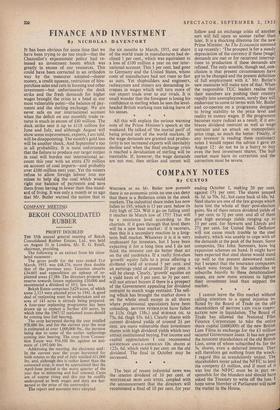COMPANY NOTES
By CUSTOS
WHETHER or no Mr. Butler now pretends there is no economic crisis no one can deny that there is a Butlerian crisis in the stock markets. The industrial share index has now fallen to 195, which is 13 per cent. below its July high of 224. Will it go on falling until it reaches its March low of 175? That will be a resistance level according to the chartists. If it goes through that level there will be a new bear market : if it recovers, then this is a secondary reaction in a long- term bull market. Whatever it is it is very unpleasant for investors, but I have been expecting it for a long time and I do not think the investor can do better than act on the old yardsticks. If a really first-class 'growth' equity falls to a price offering a divitlend yield of around 5 per cent, and an earnings yield of around 20 per cent. it will be cheap. Clearly, 'growth' equities on a yield basis of 3 per cent. to 34 per cent. will not attract buyers if there is a prospect of the Government appealing for dividend restraint to match wage restraint. The sell- ing which has brought the market down is on the whole small except in oil shares where professional speculators have been unloading. BRITISH PETROLEUM have fallen to 113s. (high 138s.), and BURMAH OIL IO 73s. 6d. (high 93s. 6d.). Clearly shares with current dividend yields of around 24 per cent. are more vulnerable than investment shares with high dividend yields which may attract institutional buying. For income and capital appreciation I can recommend RHODESIAN ANGLO-AMERICAN 10s. shares at 122s. 6d. which yield 6 per cent, on the old dividend. The final in October may be increased.
• • •
The best of recent industrial news was the interim dividend of 10 per cent. of WHITEHEAD IRON AND STEEL coupled with the announcement that the directors will recommend a final of 10 per cent. for year ending October 1, making 20 per cent. against 174 per cent. The shares jumped 4s. 3d. to 70s. 3d., but came back to 68s. 9d. Steel shares are one of the few groups which have lost the whole of their post-election gains. Six of them return dividend yields of 5 per cent. to 54 per cent, and all of them give high earnings yields ranging up to 33 per cent. for Stewarts and Lloyds and 274 per cent. for United Steel. Deflation will not cause much trouble to the steel industry, which was unable to cope with all the demands at the peak of the boom. Some companies, like John Summers, have big expansion schemes on hand. It might have been expected that steel shares would stand up well to the present downward trend, but I suspect that the insurance companies, which were forced by the authorities to subscribe heavily to these denationalised issues, are now more anxious to lighten their investment load than support the market.
I cannot leave the film market without calling attention to a signal injustice in- flicted by the Board of Trade on the old shareholders of BRITISH LION FILM CORPO- RATION now in liquidation. The Board of Trade has allowed the National Film Finance Corporation to take the entire share capital (£600,000) of the new British Lion Films in exchange for the £3 million secured Government loans. It has not given the innocent shareholders of the old British Lion, some of whom subscribed 6s. for the 5s. shares, even a deferred interest. They will therefore get nothing from the wreck. I regard this as scandalously unjust. The shareholders never asked the NFFC to lend the company £3 million, and if most of it was lost the NFFC must be in part re- sponsible for the blunders and should have asked the Treasury to write off the loss. I hope some Member of Parliament will raise the matter in the House.


































 Previous page
Previous page